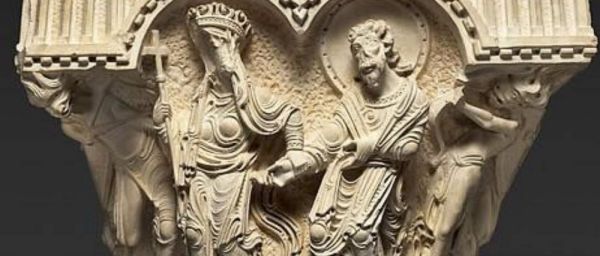Resilience not gritted teeth, and Resemblance not possessive
(Jn 15:9-11)
"Abide in love, my love [...] If you keep my commandments, you will abide in my love [...] I have told you these things so that my joy may be in you and your joy may be full."
Jesus has just used the image of the vineyard to configure the character of his new people and the circulation of life that unites them.
Life of special intensity and temperament.
The allegory of the vine and the branches is now translated into existential terms.
The propagation of the divine dynamism in us initiates a particular and accentuated current of love.
The Lord does not ask to be loved, but to receive (before transfusing) God's way - the Gift that descends from the Father and from Him.
The fate of the withered branch [deprived of the sap of the Spirit] and cut off is the sense of futility and anguish (v.6).
But - in the Vineyard - even the cuts, castings, cleanings and purifications (v.2) that life imposes do not prevent it from producing abundant and juicy clusters.
A new song, finally free of dissociation.
In fact, discomfort brings an even more pronounced flow to the bower, a walk of character, and a dilation.
It is the liberating opportunity that re-actualises being, and can overflow.
He wants to bring us to the house that belongs to us, not into a territory of chronicity [nailed to the yoke of the canons].
The farmer is the Father (v.1) who cuts and trims the vine of useless shoots - though they too appear green (v.2) - in order to increase the vitality of the field.
Here we linger, surrendering our forecasts to Grace - in the paradoxical protection of personal concentration.
Let us leave it to Him to bring down the infecund disguises.
In this way, it will be the wise Farmer who extinguishes the dispersive patterns and ignites our voice - the voice that belongs to us.
The energy of metamorphosis that will expand from critical situations will make us be, instead of look like [outside].
From within, the searching gaze will be shifted and made essential, leaving room for the virtue of one's own roots.
Gradually the act that required sterile forcing will be skilfully dismantled - so that we do not close ourselves off in preconceptions.
Apparent strength will have to give way to real strength.
By Way, everyone will accept another self-image; without detaching themselves from living together.
Holding on will give way to flexibility, to vocational melody.
Thus, making way for the authentic way of being.
As we learn to take a good look and rely on all that providentially appears, elastic answers will spring forth.
Personal Joy will pour into the soul - not the fatuous one of euphoria or exaltation, transient of the many leaves [to be e.g. like the others; at all costs 'safe', accompanied or crowded].
Because by not having to hide other preferences, a different identifying character, or our own frailties, we will become stronger.
Without always having to control the situation.
The intimate joy that will activate us will be the fruit of a new awareness, which finally contributes to the 'catholic' conviviality of differences.
Awareness that combines the divine proposal of non-possessive similarity with our ability to welcome ourselves - not to struggle unnaturally.
Even in vulnerability. Despite the different tastes around.
An ad personam life-wave that becomes uncommon resilience, and different Happiness.
The experience of fullness, of correspondence in understanding the meaning of one's being, is an impossible task in terms of both capacity and project.
Or of cerebral predictions, normalised expectations, intentions of perfection. That would be a grave commandment.
By forcing, by not laying down mental models, by not stepping back a little in the induced thoughts, the feeling of a human being's condition on earth as a conflicting event, woven with restlessness - unfulfilled, tragic, absurd - would finally prevail.
Taking hold of God is not the result of any expectation, nor of emotions, situations on command, but of allowing oneself to be saved: being introduced into a life of the saved - which sometimes comes suddenly, always unexpectedly.
Loving (even) God cannot be a devout initiative: it is only a gritted-teeth response to an unthinkable and unprepared Manifestation, which precedes and astounds the religious, personal identification of the world.
By remaining in the Father-Son circulation of love, we will be enveloped by an intoxication that intuits the meaning and uniqueness of our seed.
It changes the way we see life, relationships, suffering, and Joy.
Laying aside the efforts and brooding, encountering the enigmas and unknown sides, here is the Wisdom that dwells within us.
To internalise and live the message:
What sap satiates you, the external one?What is your idea of improvement and Happiness?
What is your existential awareness of Revelation?












